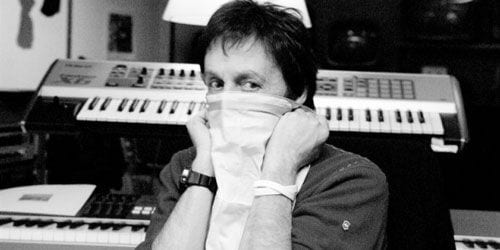
When Paul McCartney released Chaos and Creation in the Backyard, his 2005 album produced by the schlock-resistant Nigel Godrich, it resonated as a creative sea change, a long-awaited antidote to over two decades of indulgent mediocrity. It was full of strong songs that sounded great — thanks in part to Godrich, who helped separate McCartney’s wheat from his chaff, and steered the sound towards the homegrown techniques of McCartney’s past. It’s not like McCartney has anything left to prove — he is, after all, a Beatle — but the success of Chaos emphasized the fact that McCartney’s biggest enemy in creative endeavors has often been himself, and a true creative partner (one who, like Godrich or John Lennon, will play an intrepid devil’s advocate) does wonders to the quality of his output.
Such wonder — to be taken aback, to be pleasantly surprised by a new solo McCartney record?! — will most likely prove to be an anomaly in the grand scheme of things. The follow-up to Chaos, Memory Almost Full (produced by David Kahne), is the Great Reversion back to safe routines and pleasant humdrums, in every way the opposite breed of record than its predecessor. Its rock tracks are stadium sized and technically flashy: the best songs are those performed by McCartney alone, and his otherwise excellent touring band, which appears on half of the album, leaves no nuance unsullied; its ballads are cut from habit: a song like the plodding “You Tell Me” is second-rate when compared to Chaos‘s “Jenny Wren”, and “House of Wax” lays the power balladry on a little too thick (complete with thunder!).
Many of the songs on Memory Almost Full were, in fact, started before Chaos was produced — you can’t help but wonder if maybe some of these songs were those originally deemed too inferior for inclusion on Chaos. The opening track, “Dance Tonight”, is built on a spare backbone (mandolin, bass guitar, kick drum), a skeletal ethic that bleeds through into the lyric: “Everybody gonna dance tonight / Everybody gonna feel alright / Everybody gonna dance around tonight.” It’s all so rudimentary that it’s nearly extraordinary. “Gratitude”, a midtempo piano ballad with exaggerated harmonies straight out of a Queen record, is similarly comprised of underachieving lyrical composition and black-and-white sentiment: “I’m so grateful for everything / You’ve ever given me / How can I explain what it means / To be loved by you / Show my gratitude / I want to show my gratitude.” And, lest the impression left here is one of total disappointment, moments of greater depth are occasionally glimpsed, from flirts with experimentalism (the stubborn flashes of sonic interruption in “Vintage Clothes”) to dizzying harmonic arrangements (check the plummeting voices that announce the start of “See Your Sunshine”). Through it all he’s still impeccably Paul, purveyor of bass lines that trot like giddy rascals and owner of that ageless voice that continues (somehow) to serve as a bastion of pop thrills. Younger bands may do “Beatlesque” better than McCartney these days, but there’s still an evocation of sentimental, effervescent charm to everything he touches.
As its title would suggest, Memory Almost Full is largely about reflecting upon life and the past, though that’s not to say it’s a tough-hewn reckoning with mortality à la Bob Dylan’s Time Out of Mind. There’s “the things I think I did when I was a kid” (“Ever Present Past”) sentimentalizing, and other bittersweet rummages through the archives of a mind. Some of the reminiscing is the kind of superstar egotripping that McCartney’s audience can hardly relate to — take “That Was Me”, a little boogie rocker that waxes incredulous at a charmed life: “That was me / Sweatin’ cobwebs / Under contract / In the cellar / On TV / That was me / The same me that stands here now / If fate decreed that all of this would make a lifetime, who am I to disagree?” That sort of reflection is redundant self-marketing from a man whose history we all know too well. More profound reflection is made on the penultimate ballad “The End of the End”: “On the day that I die / I’d like jokes to be told / And stories of old / To be rode on like carpets / That children have played on / And laid on while listening / To stories of old.” The music, too, occasionally doubles back on its own past: the twist in the melody of “Ever Present Past” is cribbed from “Come and Get It”, a song McCartney gave away to Badfinger; the plangent string arrangement that opens and closes “Only Mama Knows” automatically recalls “Eleanor Rigby”; and the medley of five songs near the album’s end is another incarnation of McCartney’s age-old segueing trick, one that he did first (and best) with the b-side of Abbey Road.
The release of Memory Almost Full comes at a significant moment in McCartney’s career and life: it’s his first release for Starbucks’ Hear Music label, which also marks the end of his long tenure with EMI; and it arrives on the heels of Sgt. Pepper’s Lonely Hearts Club Band‘s much-publicized 40th anniversary and two weeks before McCartney’s own 65th birthday. It’s an appropriate time, then, to recollect and reflect, to celebrate accomplishments of the past by fashioning new directions for the future, and, it would seem, to rest once again on well-worn laurels of all-too familiar distinction.

![Call for Papers: All Things Reconsidered [MUSIC] May-August 2024](https://www.popmatters.com/wp-content/uploads/2024/04/all-things-reconsidered-call-music-may-2024-720x380.jpg)



